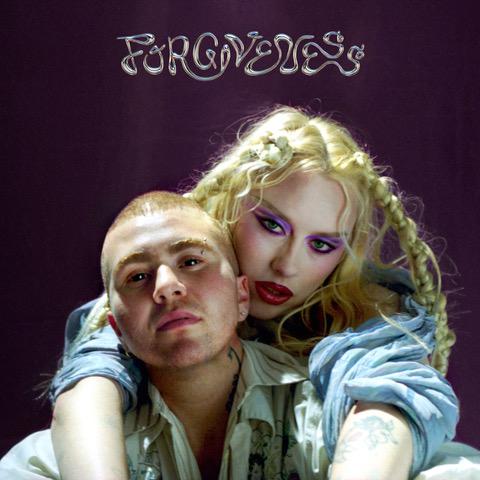Band: Girlpool
Album: Forgiveness
VÖ: 29.04.2022
Label: ANTI- / Indigo
Website: http://www.girlpoolmusic.com/
Avery Tucker and Harmony Tividad have been making critically-acclaimed music as Girlpool since they were high schoolers, scurrying around Los Angeles’ all-ages concert spaces and skipping class to play gigs with their friends. As their radically minimal first full-length Before The World Was Big was winning them fans far beyond the DIY circles they came from, the duo was testing out life on the east coast, where they continued to translate the bittersweet beauty of late-adolescence into melodic punk and indie-pop. Their next two albums, Powerplant and What Chaos Is Imaginary, are sonic time capsules documenting their development — as songwriters, but also as humans, moving through the world together and separately.
A few years ago, Girlpool returned full-time to their hometown of Los Angeles. Now in their mid-20s, Avery and Harmony are coming to terms with what it means to reengage with the sprawling sunburnt metropolis of their youth as adults. Unsurprisingly, they’ve started making songs that feel as complex and mysterious as the experiences that have shaped this tumultuous era of their lives. Enter Forgiveness, the brand new full-length Girlpool album, which finds the duo embracing weirdo-pop decadence without sacrificing the poetic curiosity that has always made their music so absorbing.
Just like they did for What Chaos Is Imaginary, Harmony and Avery each wrote their Forgiveness songs separately, then came together to decide how to present them in a style that felt representative of what excites and inspires them now. This time, the process resulted in their slickest and most ambitious music to date, filled with idiosyncratic and provocative gestures that simultaneously support and complicate the emotionally intricate material. With its unique blend of introspective earworms and surreal party music, Forgiveness reaches beyond the loosely sketched parameters of “indie rock,” challenging any preconceived notions of what a Girlpool album can or should be.
That growth manifests beautifully on “Faultline,” the new record’s woozily elegant first single. Every week keeps slipping by / in this imitation paradise, Harmony sings, her voice angelic-sounding atop a loungey, vertiginous groove. “Faultline” is an effective introduction to the world of Forgiveness, and not just because it alludes to the seismically tenuous landscape that backdrops several of the album’s songs. The notion of straddling a fault line feels somewhat indicative of Forgiveness on the whole. These songs investigate the always-shifting boundaries between a number of elementally human concepts: pain and pleasure, sex and love, reality and delusion, insecurity and confidence, grief and growth.
“A lot of my songs on this record are about relationship dynamics where I experienced frustration and pain, and struggling to hold a lot of complexity in my emotions” Avery explains. “Writing Forgiveness helped me fit all those pieces into an acceptance: that my fate pushes me exactly where I need to go.” Harmony feels similarly: “A lot of life feels like unavoidable experiences to me,” she adds. “To me, Forgiveness is about accepting that concept. It’s about forgiving reality for having to be exactly what it is all the time.”
To support their vision of a sound at the intersection of Hollywood futurism and post-grunge sincerity, Girlpool enlisted help from producer Yves Rothman (Yves Tumor, Miya Folick). While they had conversations with other potential collaborators, Rothman’s genuine enthusiasm for crafting music at that crossroads — freaky and fucked-up, but also heartfelt and grounded — helped seal the deal. Rothman’s input on Forgiveness marked the first time Harmony and Avery allowed someone all the way inside their intimate, borderline telepathic approach to song-making — a pure partnership that has remained constant, even as the music has evolved.
They all agreed on a subtle atmosphere for “See Me Now,” an acoustic ballad near the end of Forgiveness. Avery, who transitioned in 2018, wrote the song about a harmful compulsion to compare himself to cis men, about sometimes feeling inadequate and paranoid. When I was young / for a girl, I was tough / now I’m figuring out / how you see me now, he sings over warm, delicate strumming. While he has sung impressionistically about similar insecurities on older Girlpool songs, this track marks the first time that he wrote about them sans ambiguity. “That was healing for me,” he explains, articulating a release of unspoken energy that feels so real, so raw, so Girlpool.
The aesthetic and thematic breaking points explored on Forgiveness, a collection of songs written by two distinct artists with their own minds and hearts, could have resulted in an album that felt disjointed or unfocused. In Avery and Harmony’s hands, though, these fault lines generate more beauty than tension, as if in Girlpool’s world the movement of tectonic plates doesn’t spell disaster, but rather marks the beginning of something else, something exquisite and new. In this instance, it’s signaling a major step forward for two of this generation’s most accomplished chroniclers of life and love at the edge of the world.
Vorherige Infos:
Band: Girlpool
Album: What Chaos Is Imaginary
VÖ: 01.02.2019
Label: ANTI- / Indigo
Website: http://www.girlpoolmusic.com/
Never before has a group's maturation been so transparently attached to the maturation of its members. This is due in large part to the fact that Girlpool came into existence exactly when Girlpool was supposed to come into existence: at the most prolific stage of the digital revolution. Both online and in the flesh, Tividad and Tucker practice radical openness to the point where it may even engender discomfort; this is exactly the point where it becomes clear why theirs' is such a special project: they accept the possibility of discomfort-Chaos-and show you how to figure out why you might feel it. This is achieved through their ability to empathize as best friends and partners in creation, with the intention of making music that provokes.
They met in November of 2013, and released their self-titled EP just 3 months later. Both were playing in multiple bands at the time. Harmony was 18. Cleo was 17.
The growth they have fostered in one another over the years explains the project's disparate discography; each record is a photograph of Girlpool, growing over time. Their roots are a certain shade of punk-organized chaos dressed as earworms. "Where You Sink," one of the first singles off their upcoming record, What Chaos Is Imaginary, gives you an idea of how much things have changed since 2014.
It's not all good.
"I was experiencing a lot of mental health issues," says Tividad of the title. "That song comes from a place of being disconnected from reality. The world is so complicated. It's hard to believe in magic, or that anything exists." Notice the order: magic, then the principle existence of things. A peak into Harmony.
Though it is the 3rd track on Girlpool's newest record, "Where You Sink" was written at a time when the two were living in different states on the East Coast. It proved to be a period of immense change for the both of them; each focused-more than they ever had before-on their solo music.
"Before, we would build our songs together with four hands, from the ground up," says Tucker, referring to the songwriting process that produced the debut EP and 2015's critically acclaimed follow-up, Before The World Was Big. "Our songs used to be intertwined in a different way. We brought our separate experiences to the songs that we crafted together, we valued understanding that they were multidimensional."
Their solo work consistently breathes new life into Girlpool. The two have since become comfortable with the process being more independent, more fluid. They both take part in the production and arrangement of the music, but they've strayed from beginning hand in hand in every instance. They connect somewhere along the way, working together when it feels right.
Discussing the new process, Harmony says, "It's helped me find validity in parts of my writing I found to be unapproachable. I thought my stream-of-consciousness was unsophisticated." There's probably a great pun available re: shedding self-consciousness to release a more sophisticated stream-of-consciousness. In any case, What Chaos is Imaginary-the record and the song-is what the stream looks like when self-consciousness is shed.
Where Harmony embraces chaos, Cleo organizes it. "It's hard for me to feel completion without achieving a vision that I have. I'll imagine the kind of climate I want to create inside a song," says Cleo of his process. "Once I fall in love with the direction, it's getting there that can take time." Finishing a song may take time and even prove to be difficult for him at times, but the product is invariably polished. Considering the near-perfect balance in the songs on What Chaos is Imaginary, their dynamic makes sense. "It took a really long time to record this record. It feels like a photograph of a very transitional time."
What Chaos is Imaginary is a collection of songs unlike any Girlpool songs you've ever heard, exactly what Powerplant was to Before The World Was Big. For the first time, it is clear who wrote what song. 2019 will see drum machines and synthesizers and beautiful/new harmonies and huge guitars and at least one orchestral breakdown by a string octet.
"It was invigorating playing stripped down and raw when Girlpool began. As we change, what gets us there is going to change too."
It's hard to imagine what might follow What Chaos is Imaginary. Girlpool's growth has a steady momentum forward, towards something greater with every stride that they take. By the time the record comes out, they'll be far from here, wherever here is.
Infos zum alten Album:
Band: GIRLPOOL
Album: Powerplant
VÖ: 12.05.2017
Label: Anti- / Indigo
Website: https://www.facebook.com/GIRLPOOOL/
Life has been a whirl for Girlpool since the release of their acclaimed 2015 debut Before the World Was Big. Shortly before the record came out, Harmony Tividad (she/her) and Cleo Tucker (they/them) relocated from their hometown of Los Angeles all the way across the country to Philadelphia, where they quickly became embedded in the local D.I.Y. scene. "Before BTWWB, I was just out of high school, living in my old neighborhood," recalls Cleo Tucker. "Then we started touring in a way we'd never done before. I really started to experience the duality that was beginning to exist in my life: tour/not on tour." After a chaotic and informative year spent floating around the East Coast, both bandmates moved home to California at the start of 2017. Girlpool have been seemingly everywhere at once, exploring all the world's offerings with open minds and notebooks. All the lessons they learned, about the earth and about themselves, are gathered together in their sophomore record and ANTI- debut, Powerplant.
Over 10 days in August 2016, Girlpool holed up at Los Angeles' Comp-ny studios to record and mix Powerplant with Drew Fischer. For the first time, Harmony and Cleo were joined by a third performer, drummer Miles Wintner, a friend who easily meshed with the tightknit duo. The decision to add percussion came as a natural decision for Harmony and Cleo; "Cleo and I just were driving down the New Jersey turnpike when she mentioned that it might be exciting to expand our sound for the new songs," says Harmony. "The songs we were writing had the potential of getting really climactic," adds Cleo. "I think percussion adds a new part of the musical dynamic that we want to explore."Girlpool's eagerness to evolve should come as no surprise; in the same way that there were little traces of their self-titled EP on BTWWB, on Powerplant, the pair shed their old skins with more eagerness than before. "In some ways I feel more courageous and mature and in other ways I feel smaller and softer, sometimes even more fragile than ever," says Harmony, adding that while the inner self is always changing, ultimately the end is a closer self-truth.
The 12 tracks that compose Powerplant grow and burn with greater fire than the duo have possessed heretofore. Both bandmates were heavily inspired by Elliott Smith, the Cranberries, the Cocteau Twins, Brian Eno, Arthur Russell, and Graham Nash; the influence of each appear in the record's deliberate and intricate guitar work ("Fast Dust," "She Goes By") as well as its embrace of dissonant noise ("Corner Store," "Soup"). Though they were living apart for most of the writing process, the pair still managed to write all but four songs together, another testament to their dedication to Girlpool and each other. Now 21 and 20, Harmony and Cleo confront projections, despondency, apathy, romanticization, love, and heartbreak with a more devastating emotional pragmatism than before. "Looking pretty at the wall is my mistake in love installed/While the moth doesn't talk but in the dress the holes you saw," they sing on opener "123," perfectly refracting the truth. More humorous (but still heavily symbolic) lines are delivered with equal poignancy, like Harmony's disclaimer on "It Gets More Blue," "The nihilist tells you that nothing is true/I said I faked global warming just to get close to you."
Both bandmates believe that radical vulnerability and honesty are essential to discovering oneself. "I see vulnerable softness as a place where the honest self can come forward," Cleo explains, saying that on Powerplant, Girlpool aimed for sincere expression. "As a society I feel that we perceive softness and vulnerability as traits that are 'weak,' and people emotionally disconnect themselves in order to avoid going through everything they feel," Harmony adds. "I think what is most important right now is empathy, and in order to have empathy we must first feel what we, ourselves, feel." Perhaps what really makes Powerplant a home run is that Girlpool understand exactly how to use their incisive lyrics, soft textures, hushed harmonies, and soaring hooks for maximum emotional impact. In these moments, when Harmony and Cleo's voices join together to deliver transcendent transmissions straight from their hearts, Girlpool become a league of their own.



